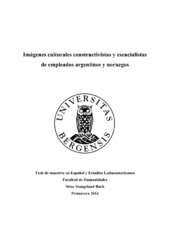Imágenes culturales esencialistas y constructivistas de empleados argentinos y noruegos
Master thesis
Permanent lenke
https://hdl.handle.net/1956/8259Utgivelsesdato
2014-05-15Metadata
Vis full innførselSamlinger
Sammendrag
El objetivo de este trabajo es analizar las actitudes culturales que perciben los empleados noruegos y argentinos. El análisis se basa en entrevistas realizadas en empresas noruegas situadas en Argentina. El trabajo pretende averiguar si las imágenes culturales son esencialistas o constructivistas. Hay una tendencia a que el esencialismo y las culturas nacionales son predominantes en la teoría tradicional de la comunicación intercultural en el ambiente empresarial. En el análisis se muestra que hay una coherencia entre las descripciones esencialistas y los niveles nacionales y regionales. Por lo tanto, el trabajo pretende mostrar que el enfoque intercultural en las empresas internacionales aportan una perspectiva más compleja de la cultura que solo una perspectiva esencialista The purpose of this study is to analyse attitudes towards culture among Norwegian and Argentinean employees. This project challenges the essentialist descriptions that explain business behaviour solely on the grounds of national cultures such as e.g. Lewis (2007) and Hofstede (2001). The discussion is based on 7 interviews conducted with Argentinean and Norwegian respondents in Buenos Aires, during the spring 2013. Essentialist views on culture in a business context tend to provoke cultural stereotypes, ethnocentrism and prejudices. The main purpose of this thesis is to show that culture can be described in a more complex way, from a constructive perspective and on different levels. By comparing some of Lewis' and other theorist's cultural descriptions with my findings, the differences and the similarities are emphasized. The analysed data shows that the culture within the respondent's company is generally more relevant than the national culture itself. Thus, the results indicate that the respondents describe their own and the other's culture in a more constructivist way when including the organizational level. When the respondents describe the culture on either a national or regional level exclusively, however, the description tends to have a more essentialist perspective than when the respondents include organizational, group or individual levels. The more levels included the more constructivistic the description becomes.
